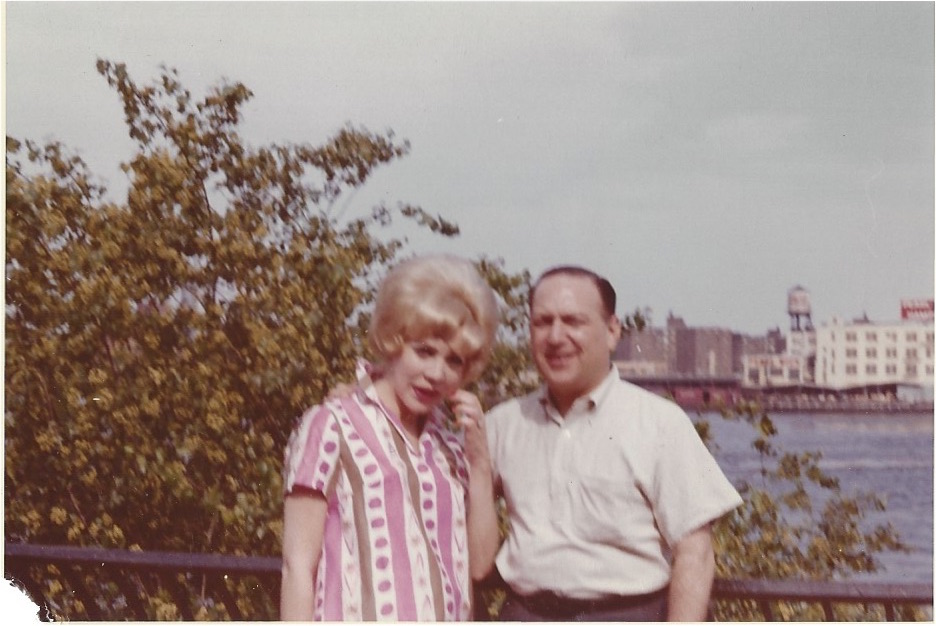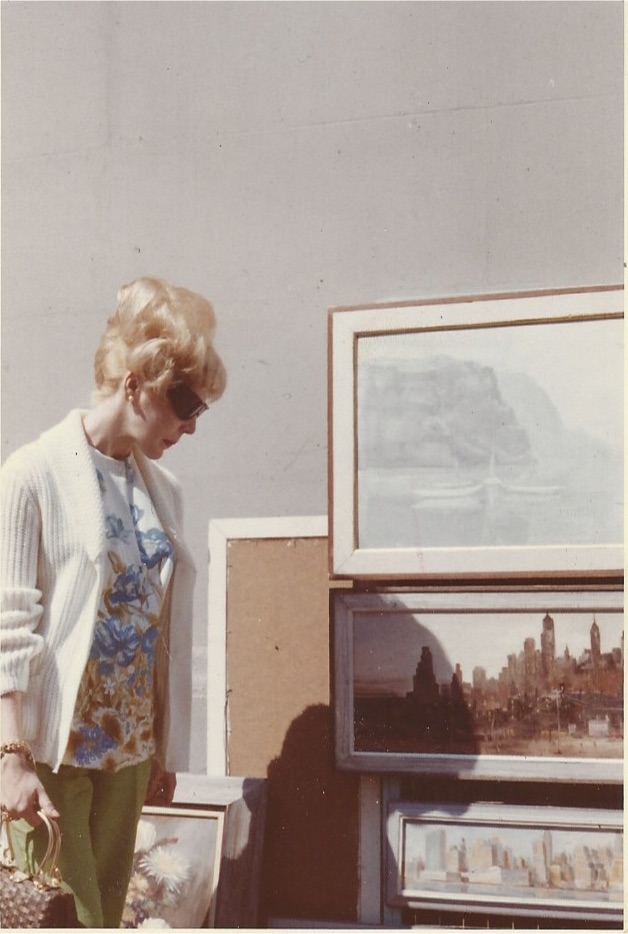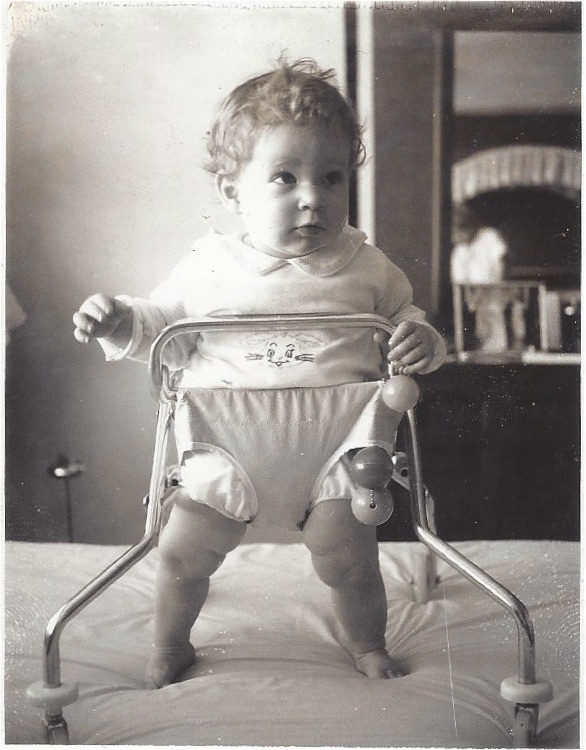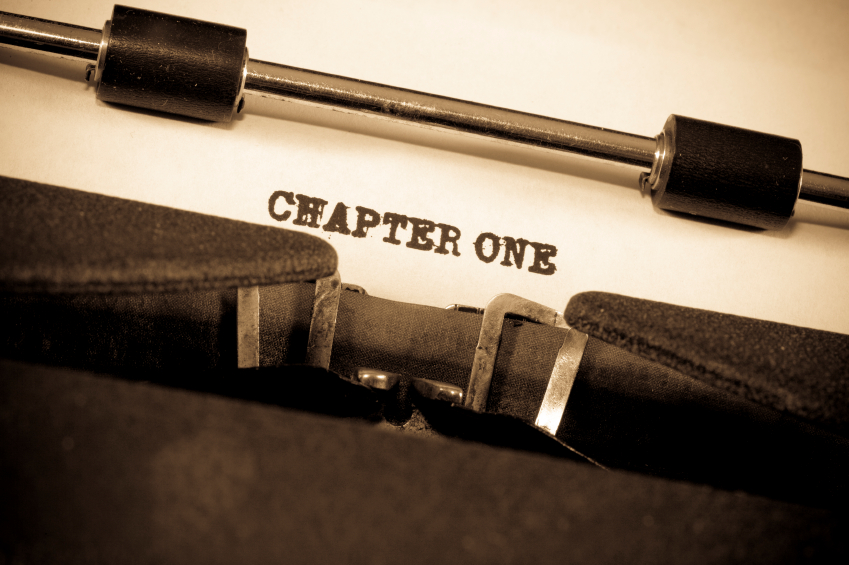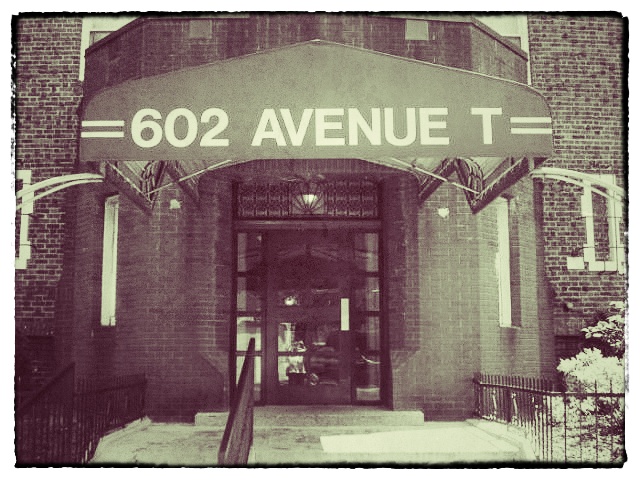I was a particularly tiny baby; my mother didn’t know that she was pregnant for six months (being unable to get her antique garnet ring off was a clue; she went to the doctor at her teenage niece’s suggestion) and the diagnosis sent her into a tailspin. In a shaky picture of my parents taken by my grandmother in Carl Schurz Park, the evidence is barely noticeable: there is my mother, the East River over her shoulder and Queens behind her in the distance, her wrists so slender and lithe even in her ninth month that her charm bracelet, heavy as Marley’s chain, would slide off her hand until she had a few links removed. There I am, the incontrovertible affirmation of her pregnancy, and nothing more than a minuscule bump under her pink and white cotton blouse. My mother carried me to term, almost to the day; I weighed four pounds at birth which, for scale, is more or less the size of an average supermarket chicken.
The words my mother uses to describe me as an infant: spindly, delicate, tiny, petite, exquisite, dainty, fine-boned, wispy. Not being one to nurse — I would have wound up with a chest like your grandmother’s, she says — she fed me tiny amounts of formula, botching the instructions given to her by my first pediatrician at New York Hospital. I screamed all day and all night for my first three months, until our next door neighbor in Yorkville, a gorgeous German woman with a face like Marlene Dietrich, told my mother that I was probably hungry; she instructed her to fill my bottle with thinned-out oatmeal, cut an X in the nipple, and let me eat. She did, and at last, I stopped crying. I also ballooned up like a scaled-down version of The Michelin Man.
Eventually, the oatmeal weight fell off me: like most middle class American children of the Sixties and Seventies, I was fed a regular diet of meat, chicken, fish, lamb, and, because I was almost always anemic, beef liver, which looks surprisingly like beef liver. I shuddered at its jiggling, squidgy presence; my grandmother, who cooked most of our meals, broiled it until it took on the consistency of a stiff brown sponge, and my mother served it to me on our heavy burnt umber earthenware next to two flaccid spears of canned asparagus; there was no bread at our kitchen table, no rice, no pasta, and infrequent potatoes. My mother and I drank Tab by the bucketful, going through a six pack every two days. By the time I was four, I had become an unwitting adherent to something resembling The Atkins Diet; I was so skinny that my mother shook me into my school leotards like a pillow into a pillowcase. When I went into first grade, I carried damp tuna sandwiches made on Diet White bread, which disintegrated into a dense brick of bleached mush that curled itself around my red plaid thermos like the letter C by the time I arrived at school.
As I wrote in Poor Man’s Feast, when my mother went off to have her hair done every Saturday, my father — not someone I would call corpulent, but certainly not thin — secreted me away for fancy lunches that were as enlightening as they were forbidden: I learned what happens when you apply a coating of egg and flour to trout, saute it in hot butter and bathe it in wine and lemon juice. I learned what happens when you slice potatoes to a thin film, layer them in a shallow copper dish, and blanket them in cream. I learned what happens when you roll a crepe around warm apricot preserves and dust it with confectioner’s sugar and chopped hazelnuts. And I learned to keep my mouth shut once I got home, because food was the enemy of the body.
My mother went back to work when I was eleven; my grandmother stepped in after school and fed me regular grilled cheese and bacon sandwiches, potato latkes, pizza, and, because she loved him, Arthur Treacher’s fish and chips. All that food fueled my raging tennis addiction; I played it every day, for hours. My mother never noticed what I was eating because my grandmother chose not to tell her, but also because all that tennis turned my skin and bones into solid muscle. I became a swimmer and my shoulders broadened; I hit puberty and the chest that kept my mother from nursing me as an infant was suddenly mine. My mother’s desperate, hysterical need for thinness, achieved by starving her teenage self in order to be the model and television singer she eventually became, was a blip on my genetic screen. My body rebelled in the most profound of ways: I was no longer skinny. As a teenager, I began to resemble almost every woman on my father’s side of the family: thick-boned, solid, muscular, and zaftig enough to acquaint me with the bitter flavor of self-consciousness.
“You’ll lose that chest if you drop some weight,” my mother said when I started college, as though That Chest was a disembodied entity unto itself, with a mind and government all its own, like Texas. At school, the freshman fifteen worked the other way for me: with everyone gorging themselves on pizza and East West lasagna at the cafeteria, I ate nothing but taco-flavored Doritos and Diet Coke in my dorm room, but only when my roommate wasn’t around. I came home that October, fifteen pounds lighter.
My mother was confused and irate a few years later, when I went to work for Dean & Deluca, and attended cooking school at night: I wanted food in my life. I wanted to understand sustenance, and to find that almost spiritual connection that comes from feeding your self, and others, thoughtfully and well. I wanted to recreate a family table of goodness and peace, where food was not the devil, and it didn’t have to be hidden.
My body responded to the stress of her furious consternation with uncanny irony: surrounded as I was by masses of food every day and night, the pounds cascaded off me without my even trying to lose them. My nails went brittle and my hair thinned, and then fell out. My thyroid was off kilter and my heart rhythm wonky and I passed out twice — once in the walk-in, once on the loading dock while signing for a Sid Wainer delivery — but man, did my body look great: my fat jeans were a size two, my everyday pair, a zero.
“Okay,” she said, as though I was competitively orchestrating my weight loss, “you win. You can stop now.”
Over the years, my body has settled like a house; the Title Nine catalog invariably arrives when I’m feeling sluggish and thick. My knees and hips creak, and I have a bottle of Aleve in every bag. No matter what — no matter how many steps I take, no matter how dedicated to my FitBit I am, no matter how much yoga I do, no matter how often I go to the gym, no matter how much I cut out wine or sugar or infrequent potatoes — my weight travels along a five pound continuum: sometimes I’m up, sometimes I’m down. Like my mother when she was pregnant, I gauge change by how tight my rings are. On the days when I can’t get them off, I don’t go to see her; I don’t tell her why.
Recently, she came to stay for Passover and Easter; I saved my beloved matzo brei — the crack cocaine of my people, which I make once a year — for the breakfast after our seder. That morning, we sat at my dining room table while she drank a cup of hot water and watched me lift my fork to my mouth; she glared violently at it, and me, like we were the devil incarnate. I pushed myself away from the table and took my plate into the kitchen; I stood at the sink and ate with my back to her, hidden from view.
